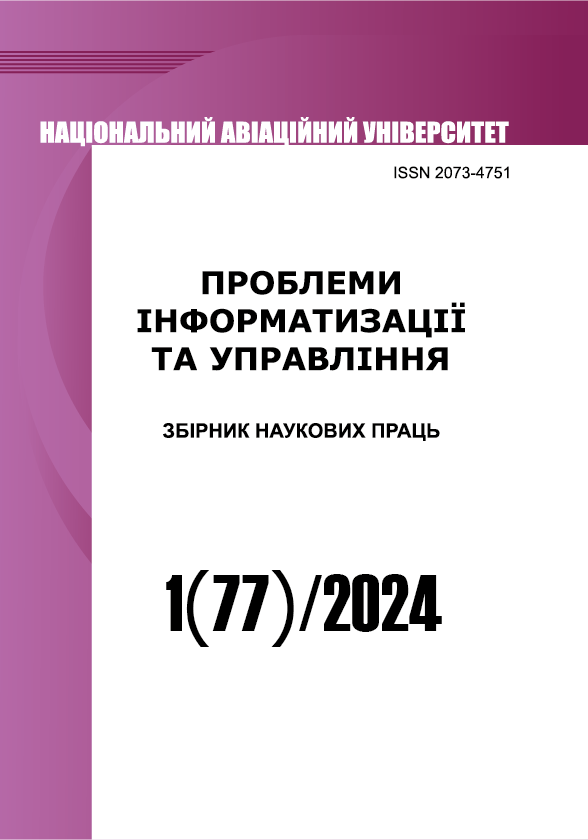Багатомодельне представлення даних для онтолого-керованої підтримки прийняття рішень
DOI:
https://doi.org/10.18372/2073-4751.77.18667Ключові слова:
система підтримки прийняття рішень, прийняття рішень, онтологія, багатомодельне управління даними, багатоваріантне зберігання данихАнотація
Прийняття рішень з використанням онтолого-керованих технологій сьогодні є результатом поєднання та інтеграції знань та даних різної природи і призначення, розв’язання множин взаємозв’язаних задач прийняття рішень, синтезу різних точок зору на проблему та процес прийняття рішень. Для багатьох задач прийняття рішень використання тільки однієї моделі даних, як правило реляційної, є недостатньо. Сьогодні для розв’язання проблеми «різноманітності» даних використовують концепцію багатомодельне управління даними. В статті розглянуті сучасні аспекти прийняття рішень, що базуються на використанні онтологій, як засобу явного розуміння та представлення областей та процесів прийняття рішень, що інтегрує методи системного, процесного та ситуаційного аналізу. В статті визначено можливі види представлень (моделей) даних, які необхідні для реалізації онтолого-керованого прийняття рішень, також визначено відповідні види інформації. В роботі для реалізації багатомодельного управління даними розглянуто та проаналізовано багатоваріантне зберігання (polyglot persistence), мультимодельне зберігання (multi-model) та хмарне зберігання (cloud-based). В роботі зроблено висновок про вибір багатоваріантне зберігання, як засобу багатомодельного представлення даних в рамках проектів, які виконувалися авторами статті. В статті описано вибрані програмні засоби для реалізації визначеного багатомодельного преставлення даних.
Посилання
Jiaheng L., Holubova I. Multi-model Databases: A New Journey to Handle the Variety of Data. ACM Computing Surveys. 2019. Vol. 52. P. 1–38.
Fowler M., Sadalage P. J. NoSQL DISTILLED. A Brief Guide to the Emerging World of Polyglot Persistence. 1st ed. Crawfordsville : Addison-Wesley Professional, 2012. 192 p.
Liu Z. H. et al. Multi-Model Database Management Systems – a Look Forward. Lecture Notes in Computer Science. Vol. 11470. Heterogeneous Data Management, Polystores, and Analytics for Healthcare. VLDB 2018 Workshops, Poly and DMAH Rio de Janeiro, Brazil, August 31, 2018 Revised Selected Papers / ed. by V. Gadepally et al. Cham, 2019. P. 16–29.
Чаплінський Ю. П. Онтологічні складові підтримки прийняття управлінських рішень. Наукові праці НУХТ. 2013. № 48. С. 65–68.
Чаплінський Ю. П., Субботіна О. В. Онтологія та контекст при розв’язанні прикладних задач прийняття рішень. Штучний інтелект. 2016. № 2. С. 147–155.
Чаплінський Ю. П. Контекстно-онтологічна системна оптимізація проблемно-орієнтованої підтримки прийняття рішень. Нові інформаційні технології, моделювання та автоматизація : монографія / за заг. ред. С. В. Котлика. Одеса, 2022. С. 6 – 44.
Neu W. et al. An Introduction to Cloud Databases. 1st ed. Sebastopol : O'Reilly Media, Inc., 2019. 48 p.
Hoffer J. A., Ramesh V., Topi H. Modern database management. 13th ed. Harlow : Pearson, 2019. 600 p.
Bradshaw S., Eoin B., Chodorow K. MongoDB: The Definitive Guide. 3rd ed. Sebastopol : O'Reilly Media, Inc, 2019. 511 p.
##submission.downloads##
Опубліковано
Номер
Розділ
Ліцензія
Автори, які публікуються у цьому журналі, погоджуються з наступними умовами:- Автори залишають за собою право на авторство своєї роботи та передають журналу право першої публікації цієї роботи на умовах ліцензії Creative Commons Attribution License, котра дозволяє іншим особам вільно розповсюджувати опубліковану роботу з обов'язковим посиланням на авторів оригінальної роботи та першу публікацію роботи у цьому журналі.
- Автори мають право укладати самостійні додаткові угоди щодо неексклюзивного розповсюдження роботи у тому вигляді, в якому вона була опублікована цим журналом (наприклад, розміщувати роботу в електронному сховищі установи або публікувати у складі монографії), за умови збереження посилання на першу публікацію роботи у цьому журналі.
- Політика журналу дозволяє і заохочує розміщення авторами в мережі Інтернет (наприклад, у сховищах установ або на особистих веб-сайтах) рукопису роботи, як до подання цього рукопису до редакції, так і під час його редакційного опрацювання, оскільки це сприяє виникненню продуктивної наукової дискусії та позитивно позначається на оперативності та динаміці цитування опублікованої роботи (див. The Effect of Open Access).


